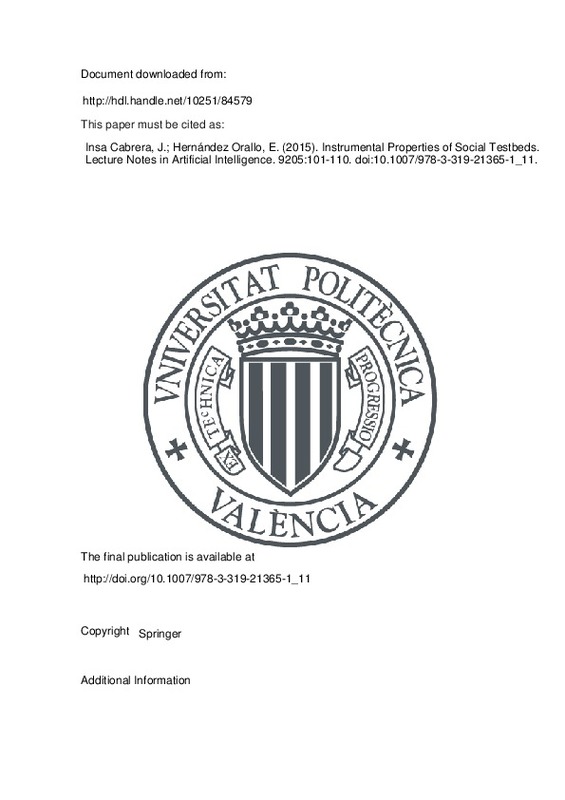JavaScript is disabled for your browser. Some features of this site may not work without it.
Buscar en RiuNet
Listar
Mi cuenta
Estadísticas
Ayuda RiuNet
Admin. UPV
Instrumental Properties of Social Testbeds
Mostrar el registro sencillo del ítem
Ficheros en el ítem
| dc.contributor.author | Insa Cabrera, Javier
|
es_ES |
| dc.contributor.author | Hernández Orallo, José
|
es_ES |
| dc.date.accessioned | 2017-07-06T11:00:09Z | |
| dc.date.available | 2017-07-06T11:00:09Z | |
| dc.date.issued | 2015-07-22 | |
| dc.identifier.isbn | 978-3-319-21364-4 | |
| dc.identifier.issn | 0302-9743 | |
| dc.identifier.uri | http://hdl.handle.net/10251/84579 | |
| dc.description.abstract | The evaluation of an ability or skill happens in some kind of testbed, and so does with social intelligence. Of course, not all testbeds are suitable for this matter. But, how can we be sure of their appropriateness? In this paper we identify the components that should be considered in order to measure social intelligence, and provide some instrumental properties in order to assess the suitability of a testbed. | es_ES |
| dc.language | Inglés | es_ES |
| dc.publisher | Springer | es_ES |
| dc.relation.ispartof | Lecture Notes in Artificial Intelligence | es_ES |
| dc.rights | Reserva de todos los derechos | es_ES |
| dc.subject | Social intelligence | es_ES |
| dc.subject | Multi-Agent systems | es_ES |
| dc.subject | Cooperation | es_ES |
| dc.subject | Competition | es_ES |
| dc.subject | Game theory | es_ES |
| dc.subject | Rewards | es_ES |
| dc.subject | Universal psychometrics | es_ES |
| dc.subject.classification | LENGUAJES Y SISTEMAS INFORMATICOS | es_ES |
| dc.title | Instrumental Properties of Social Testbeds | es_ES |
| dc.type | Artículo | es_ES |
| dc.type | Comunicación en congreso | es_ES |
| dc.identifier.doi | 10.1007/978-3-319-21365-1_11 | |
| dc.rights.accessRights | Abierto | es_ES |
| dc.contributor.affiliation | Universitat Politècnica de València. Departamento de Sistemas Informáticos y Computación - Departament de Sistemes Informàtics i Computació | es_ES |
| dc.description.bibliographicCitation | Insa Cabrera, J.; Hernández Orallo, J. (2015). Instrumental Properties of Social Testbeds. Lecture Notes in Artificial Intelligence. 9205:101-110. doi:10.1007/978-3-319-21365-1_11 | es_ES |
| dc.description.accrualMethod | S | es_ES |
| dc.relation.conferencename | Eighth Conference on Artificial General Intelligence (AGI-15) | es_ES |
| dc.relation.conferencename | 8th International Conference on Artificial General Intelligence (AGI) | es_ES |
| dc.relation.conferencedate | 2015-07-22 | es_ES |
| dc.relation.conferenceplace | Berlin, Germany | es_ES |
| dc.relation.publisherversion | http://doi.org/10.1007/978-3-319-21365-1_11 | es_ES |
| dc.description.upvformatpinicio | 101 | es_ES |
| dc.description.upvformatpfin | 110 | es_ES |
| dc.type.version | info:eu-repo/semantics/publishedVersion | es_ES |
| dc.description.volume | 9205 | es_ES |
| dc.relation.senia | 302928 | es_ES |
| dc.description.references | Horling, B., Lesser, V.: A Survey of Multi-Agent Organizational Paradigms. The Knowledge Engineering Review 19, 281–316 (2004) | es_ES |
| dc.description.references | Simao, J., Demazeau, Y.: On Social Reasoning in Multi-Agent Systems. Inteligencia Artificial 5(13), 68–84 (2001) | es_ES |
| dc.description.references | Roth, A.E.: The Shapley Value: Essays in Honor of Lloyd S. Shapley. Cambridge University Press (1988) | es_ES |
| dc.description.references | Insa-Cabrera, J., Hernández-Orallo, J.: Definition and properties to assess multi-agent environments as social intelligence tests. Technical report, CoRR (2014) | es_ES |
| dc.description.references | Legg, S., Hutter, M.: Universal Intelligence: A Definition of Machine Intelligence. Minds and Machines 17(4), 391–444 (2007) | es_ES |
| dc.description.references | Hernández-Orallo, J., Dowe, D.L.: Measuring universal intelligence: Towards an anytime intelligence test. Artificial Intelligence 174(18), 1508–1539 (2010) | es_ES |
| dc.description.references | Hernández-Orallo, J.: A (hopefully) unbiased universal environment class for measuring intelligence of biological and artificial systems. In: 3rd Conference on Artificial General Intelligence, pp. 182–183 (2010) | es_ES |
| dc.description.references | Hernández-Orallo, J., Dowe, D.L., Hernández-Lloreda, M.V.: Universal psychometrics: Measuring cognitive abilities in the machine kingdom. Cognitive Systems Research 27, 50–74 (2014) | es_ES |







![[Cerrado]](/themes/UPV/images/candado.png)

